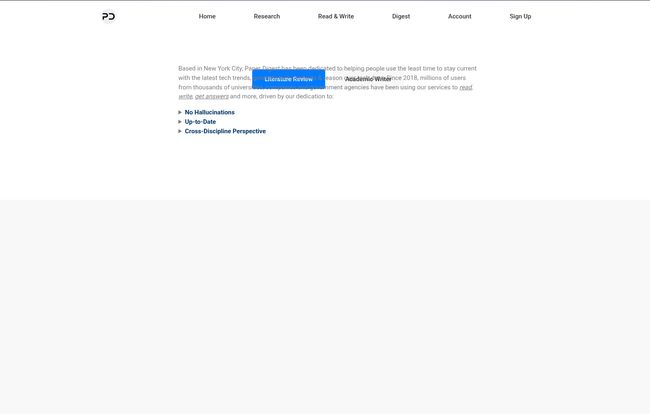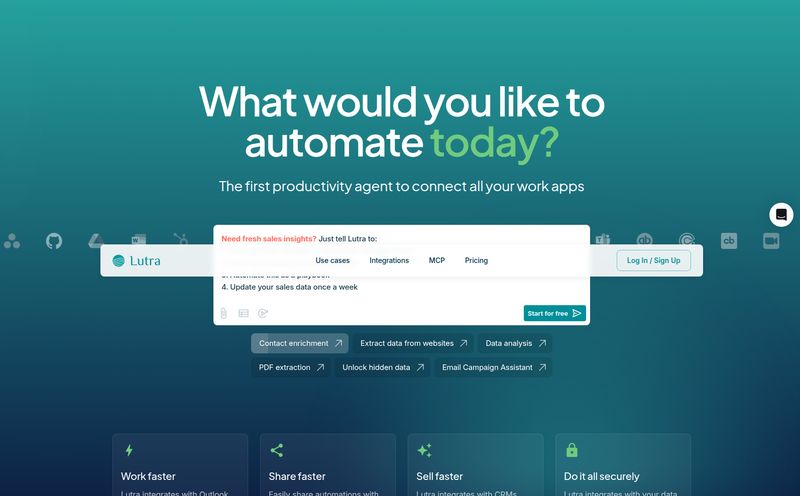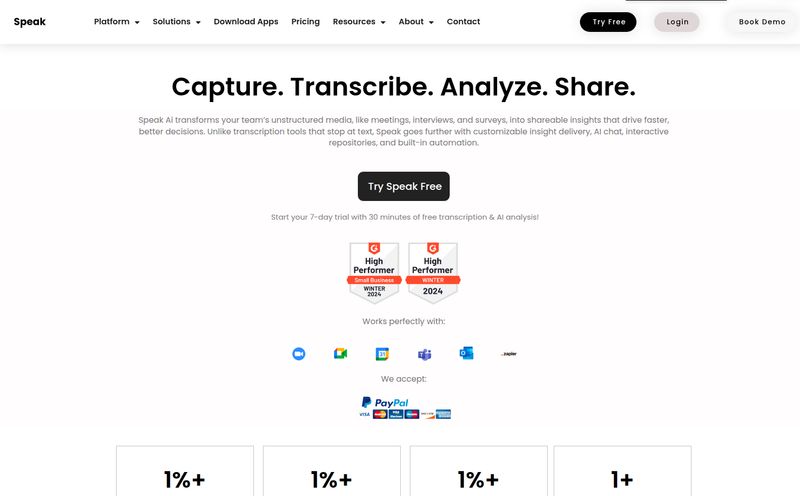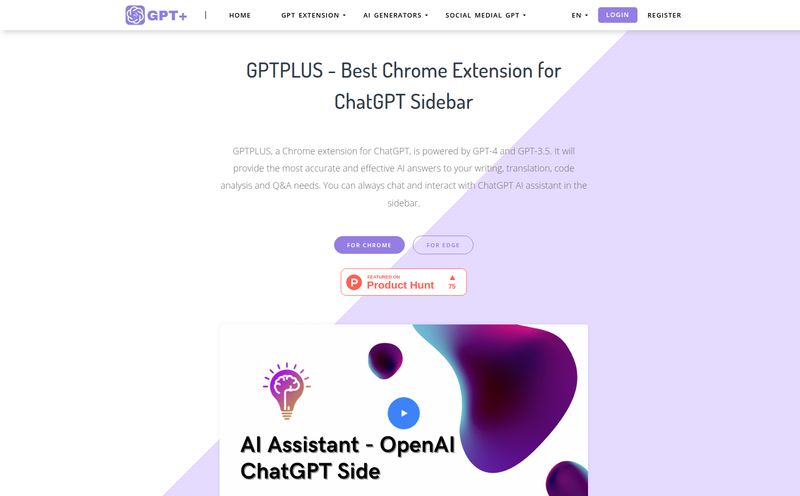If you're in any field that involves research—be it academia, R&D, or even tech journalism—you know the feeling. It’s like trying to drink from a firehose. A firehose that’s spewing out thousands of new research papers, patents, and articles every single day. The pressure to keep up is immense, and the fear of missing that one groundbreaking paper is… well, it’s a lot.
For years, I’ve relied on a messy cocktail of Google Scholar alerts, RSS feeds, and a whole lot of late-night scrolling. It's a chaotic system that barely works. So, when I hear about a tool that claims to tame this beast, my ears perk up. But I’m also skeptical. We’re in an age where there’s an “AI solution” for everything, and most of them are just shiny wrappers on a basic API call.
Enter Paper Digest. It's been on my radar for a while, quietly serving universities and companies since 2018—that's practically ancient in AI years, which gives it some street cred. It’s not a flashy new startup. It bills itself as an AI-powered research platform. Today, I’m putting it through its paces to see if it’s the real deal.

Visit Paper Digest
So, What is Paper Digest, Really?
On the surface, it’s a tool that summarizes research. But that’s selling it short. I think of it less as a simple summarizer and more as a personal research assistant. You know, the kind you wish you had during your PhD. It’s designed to be a smart filter for the overwhelming noise of academic publishing.
It doesn't just look at research papers. It scours patents, grants, clinical trials, and even software to give you a more complete picture of a tech trend. It’s about connecting the dots, not just shortening the abstracts. You can give it a specific area you’re interested in—say, 'Quantum Computing' or 'Large Language Models'—and it promises to deliver daily updates and track the topic for you. It’s a proactive approach, which is a world away from the reactive searching I’m used to.
The Standout Features That Genuinely Help
A platform is only as good as its tools. I poked around the main features to see what was actually useful versus what was just marketing fluff. A few things really stood out.
The AI Literature Review Generator (That Doesn't Hallucinate?)
Okay, this is the big one. Anyone who has used AI for serious work has been burned by a “hallucination”—when the AI just confidently makes stuff up. It's embarrassing in a marketing email; it's a potential career-killer in a research paper. Paper Digest makes a bold claim: their AI literature review generator avoids hallucinations. How? It seems to be heavily grounded in the source documents it’s fed, acting more like a synthesizer than a creative writer. This is massive. It means you can use it to generate a first draft of your literature review, knowing the citations and claims are tethered to reality. You still need to check it, of course—never trust AI blindly—but it’s a starting point you can actually build on. This alone could save a graduate student weeks of soul-crushing work.
Your Daily Dose of Curated Research
The 'Daily Paper Digests' feature is another gem. Instead of getting a dozen random Google Scholar alerts, Paper Digest sends you a single, consolidated update on the topics you care about. It feels like getting a personalized newspaper for your niche. You can quickly scan the hot papers, see the key takeaways, and decide if you need to read the full thing. It's about turning information overload into actionable intelligence. For someone tracking competitor patents or emerging tech, this is gold.
Never Miss a Beat with Conference Digests
If you've ever tried to follow a major conference like NeurIPS or ACL from afar, you know it's impossible. Thousands of papers drop at once. Paper Digest creates digests of these major conferences, highlighting the most impactful papers and trends. It’s like having a team of grad students attend the conference for you and report back with the highlights. This is a seriously practical tool for staying on the cutting edge without the travel budget or the time to read 500 papers in a weekend.
The All-Important Question: Paper Digest Pricing
This is always the make-or-break moment. Is this some enterprise-level tool with a price tag to match? Surprisingly, no. The pricing is refreshingly straightforward and, in my opinion, very reasonable for the value it provides.
| Plan | Effective Monthly Cost | Billing Cycle |
|---|---|---|
| Monthly Plan | $10.99 | Billed $10.99 every month |
| Half-Yearly Plan | $7.99 | Billed $47.94 every 6 months |
| Yearly Plan (Best Value) | $6.66 | Billed $79.90 every 12 months |
At $6.66 a month for the annual plan, you're paying less than a couple of fancy lattes for a tool that could save you dozens of hours. For an independent researcher, a small R&D team, or a student, this feels like a no-brainer investment if you're serious about your work.
The Good, The Bad, and The AI
No tool is perfect. Let's get into an honest breakdown. The biggest advantage is obviously the massive time savings. It automates the tedious part of research—the discovery and initial filtering—so you can spend more time on the important part: the thinking.
However, there are some things to consider. First, it is a paid subscription. There isn't really a free tier to live on, so you have to be willing to invest. Second, some academics are purists. They believe there's no substitute for reading the full paper, and they're not wrong. I see Paper Digest not as a replacement, but as a triage tool. It helps you decide which full papers are worth your precious time.
Finally, there's the philosophical point about reliance on AI. Does using a tool like this dull our critical thinking skills? It's a valid concern. My take is that it's all in how you use it. If you use it as a crutch and just copy-paste its outputs, then yes, you're short-circuiting your own learning. But if you use it as a springboard to ask deeper questions and guide your own exploration, it becomes a powerful amplifier for your own intellect. It's a tool, not a replacement for your brain.
Frequently Asked Questions about Paper Digest
Is there a free version of Paper Digest?
Based on their site, Paper Digest is a premium, subscription-based service. They don't seem to offer a comprehensive free-forever plan, focusing instead on providing a high-value service to paying subscribers.
How is Paper Digest different from Google Scholar?
Think of it this way: Google Scholar is a massive, powerful search engine. You go to it with a query. Paper Digest is more like an intelligent agent. You tell it what you're interested in, and it actively brings you curated digests, tracks topics, and helps synthesize information into literature reviews. It's more about synthesis and awareness than just search and retrieval.
Can the AI literature review generator really be trusted?
The platform's big claim is that it avoids the 'hallucinations' common in other AI. This makes it far more trustworthy than a general-purpose chatbot for academic work. However, you should always treat it as a highly advanced starting point. Always verify its claims against the source papers. It's a tool to assist, not to replace, your academic rigour.
What fields does Paper Digest cover best?
Given its focus on digesting proceedings from major tech conferences like KDD, ACL, and NeurIPS, it has a very strong footing in computer science, data science, and artificial intelligence. However, it is designed to be cross-disciplinary and can track topics across a wide range of scientific and technical fields.
Is it easy to cancel my subscription?
According to their pricing page, you can cancel your subscription anytime before your next billing date to avoid future charges. This is pretty standard and user-friendly.
My Final Verdict: Is Paper Digest Worth Your Money?
After spending some time with it, I'm genuinely impressed. Paper Digest isn't trying to be another flashy, do-everything AI gimmick. It’s a focused, practical tool built for a specific, and very real, problem: information overload in the research world.
It's not for everyone. If you're a casual reader, it's overkill. But if you are a PhD student, a post-doc, an R&D professional, a patent analyst, or anyone whose job depends on staying at the forefront of technology and science, I think it's a fantastic investment. It gives you back your most valuable asset: time. It lets you focus on analysis and insight, instead of drowning in the endless hunt for the right document.
It’s not magic, and it won't write your thesis for you. But it might just be the sharpest tool you can add to your research toolkit this year.
Reference and Sources
- Paper Digest Official Pricing and Sign-up Page
- NeurIPS Conference Official Website (Example of a conference digested by the platform)



